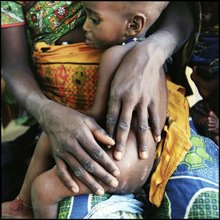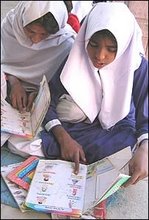PREAMBLE: In this issue we feature the "brain drain" (migration of professionals from low-resource settings to more developed ones) from sub-Saharan Africa. The report was developed by Juan Ramos, Program Coordinator of ProCOR, a web community focusing on cardiovascular disease problems in the developing world, that offers free-ranging debate on a range of related health and social issues (SEE: Recommended Links in sidebar, adjacent to June 1 blog below). The crisis is enormous, and some potential solutions are outlined in the report. It is to be hoped that there will be some practical response to these, such as striving for better compensation for indigenous health professionals, attention to policies that determine recruitment and retention of health professions in low income countries, fixing the ethics of western firms that raid poor countries to meet the service demands of rich ones, and finding ways to compensate third world "donor" countries for their loss of human resources. Through official inaction, "first world" countries benefit from a massive subsidy from the "third world", equal to the direct and indirect costs of their investment in this health human resource, and the opportunity costs entailed by its loss.
Also in the main section below we elevate an item previously presented in our sidebar: on "Corporate Hybrids". Your host, Pacific Health & Development Sciences Inc. (PacificSci), is an example of such an organization, now in its 4th year of operation.
In our sidebar: Once again we focus on Canada's political scene, with a brief capsule on Prime Minister Stephen Harper’s limited popularity, as revealed in a recent poll. We then focus on a troubling police action that may have been politically directed. Whether or not one agrees or disagrees with opposition on any given policy issue, the legal and democratic right to protest is supposed to be protected in our society. However, the recent undermining of a legal protest in a designated area adjacent to the “Security and Prosperity Summit” (involving the leadership of Canada, Mexico and the US) through use of agents provocateurs has alarmed our civil society. That Canada’s police forces were used to discredit the use of this right is cause for serious concern, and it is disturbing that the Honourable Stockwell Day, Minister for Public Security is ignoring calls for a public inquiry, issuing statements designed to diminish political accountability.
BRAIN DRAIN FROM SUBSAHARAN AFRICA
Significant numbers of African-trained health workers migrate every year to developed regions, leaving severely crippled health systems in countries where life expectancy is only age 50 and 16% of children die before age five. However, the critical shortage of health care workers in many parts of the world is beginning to receive attention from donors and international agencies. Donors are increasingly realizing that without enough trained workers to deliver drugs, vaccines and care, funding projects will not have the desired effects.
The population of sub-Saharan Africa totals over 660 million, with a ratio of fewer than 13 physicians per 100,000. The continent bears 24% of the global burden of disease but has only 3% of the health care workforce and 1% of the world's financial resources. Africa suffers more from brain drain due to economic conditions, wage differentials, rapid population growth among young people and conflict than any other continent.The worker shortage derives from a combination of underproduction, internal maldistribution and emigration of trained workers. Sub-Saharan Africa needs approximately 700,000 physicians to meet the Millennium Development Goals. Many African countries cannot meet widely accepted basic standards for health care coverage by physicians, nurses and midwives. An additional 2.4 million physicians, nurses and midwives are needed, along with an additional 1.9 million pharmacists, health aides, technicians and other auxiliary personnel.
Fewer health professionals from African countries than from other countries work in the US, according to the Least Developed Countries Report 2007. Data from the report demonstrate that the percentage of doctors practicing in the US relative to the total number of doctors back home range from 43% in Liberia to 10% in Zambia. This would not be a problem if the number of doctors remaining in their country of origin was sufficient to meet the needs of the population, but this is not the case. For example, Zambia has only seven doctors per 100,000 people, compared with the US level, which is close to 300. Even though the absolute number of professionals from the poorest countries working abroad may be small, the impact on professional services back home can be severe.
Efforts to retain workers focus on health care systems. For example, Swaziland provides HIV/AIDS services for health care workers who, practicing in high-prevalence areas with minimal resources for safety measures, are at an increased risk for occupational exposure. Other efforts build on the belief that providing workers with needed resources for care motivates them to stay and work in their home countries.Improved wages are also a key to retention. Salary support can help motivate health care workers to remain in their countries, even if it means working with fewer resources. Other types of inducements have been offered, such as lunch allowances, care loans and affordable housing.Some countries have begun to recruit trainees from rural areas. In South Africa, local students can receive scholarships for health care training on the condition they agree to return to their home district to practice. A study of the program found that trainees from rural areas were three to eight times as likely as those from urban areas to practice in rural regions after graduation.
The documented shortage of health care workers has inspired the American Public Health Association to pass a policy statement on "Ethical Restrictions on International Recruitment of Health Professionals to the United States." The policy addresses the role of the US in exacerbating the international crisis, calling on employers to adopt voluntary codes for ethical recruitment and on the government to contract only with employers who have done so. The future of global health and development in the 21st century lies in the management of the crisis in human resources for health.
More information is available from these resources on brain drain:
* "Providing the providers-remedying Africa's shortage of health care workers." N Engl J Med 2007; 356(25): 2564-67.http://content.nejm.org/cgi/content/extract/356/25/2564
* The Brain Drain of Health Professionals from Sub-Saharan Africa to Canada (3.5 MB):http://www.queensu.ca/samp/sampresources/samppublications/mad/MAD_2.pdf
* The Least Developed Countries Report 2007 (2.54 MB):http://www.unctad.org/en/docs/ldc2007_en.pdf
Source: Juan Ramos. ProCOR. Aug 9, 2007 Jramos3@partners.org
NOTE: To visit ProCOR, scan column at right to locate URL under “Recommended Links”.
CORPORATE HYBRIDS
“… organizations driven by both social purpose and financial promise that fall somewhere between traditional companies and charities…distinct from those operating in the government, business and non-profit sectors…Whatever participants call it, the fourth sector faces challenges. Current legal and tax structures draw strict lines between for-profits and non-profits… The social benefits that fourth-sector firm seek to unlock are not easily quantified and often take decades, not quarters, to attain.”
Reference: Stephanie Strom. The New York Times. May 6, 2007.
COMMENT: By definition, PacificSci is a hybrid or "fourth sector" organization. Ineligible for grants available to non-profits, nor driven by the bottom line as a purely business enterprise, nor financially underwritten by the tax payer as are universities, government bodies and international agencies, yet our contractual work, advocacy efforts and pro bono activities are all guided by our secular humanist mission: seeking solutions to the health and social impacts of development. Now in its 4th year, our philosophical model is proving operationally viable and productive.
FROM a Great Canadian and World Statesman
"A great gulf... has... opened between man's material advance and his social and moral progress, a gulf in which he may one day be lost if it is not closed or narrowed..."
Lester B Pearson
http://nobelprize.org/nobel_prizes/peace/laureates/1957/pearson-lecture.html
INSPIRATIONAL WELCOME ............................... from T.S.Eliot's "Little Gidding"
If you came this way From the place you would come from... It would be the same at the end of the journey...
If you came, not knowing what you came for, It would be the same... And what you thought you came for Is only a shell, a husk of meaning... From which the purpose breaks only when it is fulfilled If at all.


























